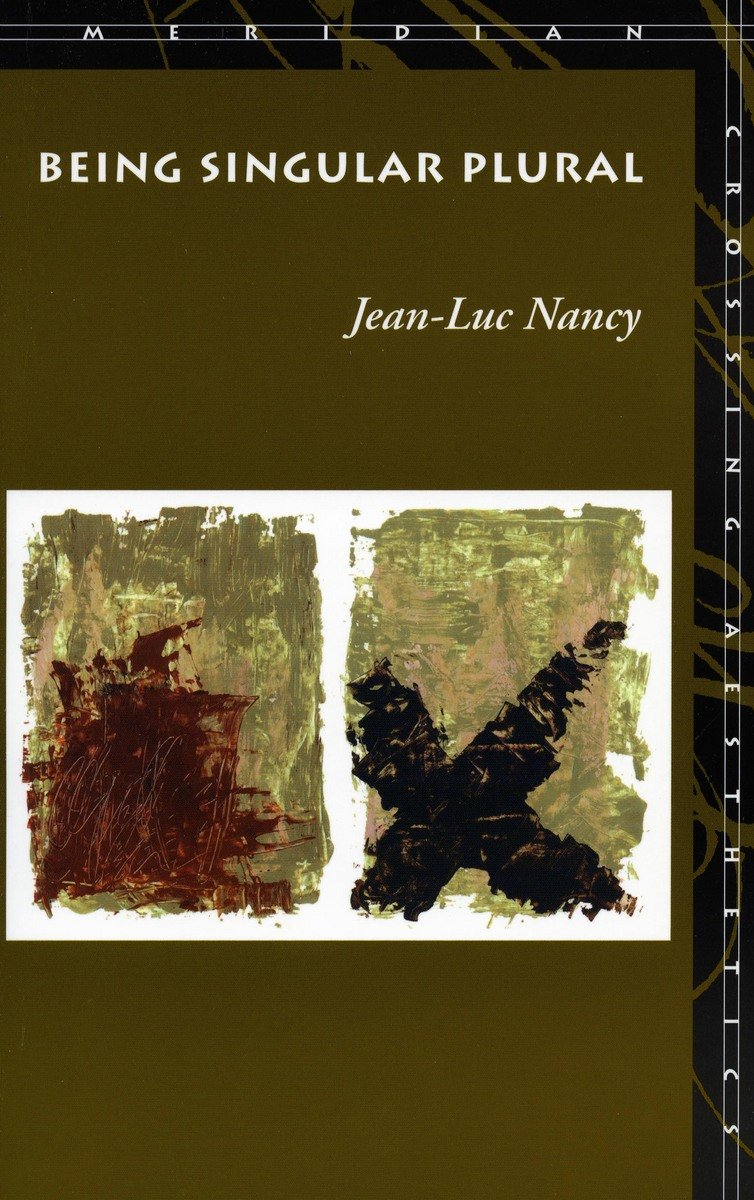معلومات عنا
حقوق الطبع والنشر © 2024 Desertcart Holdings Limited


Being Singular Plural (Meridian: Crossing Aesthetics)
B**B
NANCY'S PHILOSOPHY OF CIVIL-SOCIETY
NANCY'S PHILOSOPHY OF CIVIL-SOCIETY: Nancy consolidated his thought during the French-publication years of 1993 to 1997. This manuscript was published in 1996 and falls within that range. It should be considered as essential to understanding Nancy's overall position. Each work during these 4 years presented an important point-of-view concerning his structure of "Being".In this text, he centers on the philosophy of civil society and adds that the "primary" function of philosophy is to articulate "civil-society". He traces this emphasis back to the Greeks of Athens; where even the theater played a role in presenting the"myth" that would inform the direction of society.some of the more important aspects of this work consist of: (1) his first specific step-by-step articulation of the birth of the "self" when confronted by the "other". (2) a better presentation of "ex-scribing" as both moment and process. (3) and a better job of integrating the mediation of the "void-point" into the system; actually linking psychology and mythology. Nancy's system runs from psychology to mythology to ethics. Here, they are presented together.You get a real feel for Nancy's emphasis on aesthetics as a tandem co-positing of ethics. And often we are presented with the "stage" of a situation; the "players" of "singularities; and the "writing" of the "being-singular- plural" as the authentic expression of the interiority of meaning that the audience should see."void-point" gets addressed on both ends; as "starting-point" and later "mediation". "The sense of the world" of 1997 followed this work. Both books should be studied. A little extra plus for me was his analysis of "logos" with its "logikoi" in Greek culture. He is a superb teacher. Get it soon. 5 stars all the way.
R**S
Best discussion of meaning of "self" since Freud
After reading as many of Nancy's other works in English as I could get hold of, I am back to the re-reading I knew was necessary for this book. I needed to come back, because Nancy's distinctions are so subtle that the likelihood is either to misunderstand or to miss the subtleties.The essay that gives the book its title dares to eventuate in a discussion of love, birth, death, meaning, and most other things close to our hearts. Take love, for instance: not only do we have the Greek varieties of eros, philia, and agape, we have the Christian commandment to love others as we love ourselves. The latter is not helpful, Nancy writes, because we do not yet know who we are and consequently haven't the slightest idea who the other is. So Nancy gives us the ups and downs of understanding what it means to be-with, to be singular plural.My take is that helps to explain why we get the empty speciousness of such canards as, "You have to love yourselves before you can love another." That can make sense in a climate of psychological treatment, but for ordinary folk we are born loving ourselves and the canard just perpetuates infancy. Nancy writes, ",,,the meaning of the world as being-with (is...) where no one is for one-self without being for others."Then Nancy sings in celebration of "with" and language, and being as spacing, and almost every other issue at its fundamental level; e.g., "...the essence of singularity (is...) not individuality; it is (...), at one and the same time, infra-/individual and transindividual, and always the two together." (He notes that the "liberty" celebrated by libertarians chooses to ignore its partners, such as equality and fraternity. You can always tell a Frenchman by his verbal continuity, including these days the willingness to constructively consider Marxism.) He offers a catechism for the future of such inquiry, as his later books exemplify.This does not mean that after having read and understood better Nancy's ideas I no longer have a misunderstanding of truth, love, birth, death, etc. But I do have a better understanding of the significance of my social condition for satisfaction that deserves the name of "self."Nancy makes clear his disinterest in traditional religion, but his reliance on the concept of simultaneity does offer a style of inquiry also different from science as sequence. If one tries to imagine (and imagination has not been ruled out) everything happening all at the same time, that can be an illustration of holistic thinking. "In being-with and as being-with, we have always already begun to understand meaning, to understand ourselves and the world as meaning. And this understanding is always already completed, full, whole, and infinite." Now that's what I call radical existentialism.
M**H
Five Stars
It a good reading 📖
T**.
Five Stars
Quality book in fine condition delivered in a timely way. Thanks.
R**E
The Meaning of Being, Singular, Plural
This is a must read for some of Jean-Luc Nancy's deepest insights into the nature of "being-with" (German: Mitsein) and the associated questions of war, technology and event. Nowhere does Nancy provide such a clear and profound account of his insight into the nature of being in terms of "being-with" which is none other than a Copernican revolution in terms of the traditional metaphysical understanding of being. This is significant as it can be read in relation to Heidegger's thinking on being and Levinas's critique of Western Metaphysics and his turn to a non-metaphysical understanding of being.Nancy's insight is especially profound here as he moves from a meditation on the nature of being itself into questions of sovereignty, war and technology. This text is as such important for political theorists and political scientists working to rethink the notion of sovereignty itself in the age of global terror.
ترست بايلوت
منذ 4 أيام
منذ شهر